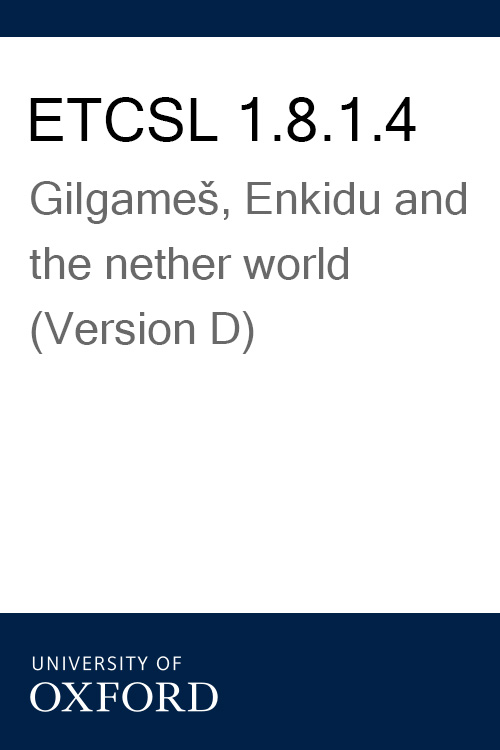Text summary
From: Website · Jeremy Allen Black · 1997

Text: Full Translation, Collation (partial)
Sumerian ⟶ English a
| Line # | Translation |
|---|---|
| [Version D] A version from Me-Turan | |
| Segment A | |
| 1-(?) | …… surrounded him. He carried …… and the spirits felt insulted (?) by him. He caused (?) ……. |
| 1 line fragmentary | |
| (?)-9 | He kissed his beloved wife, and hit his wife when he was angry with her. He kissed his beloved child, and hit his son when he was angry with him. He aroused an outcry and was detained in the nether world. |
| 10-16 | From that fateful day and for seven days his servant, Enkidu, did not come out from the nether world. The king was lamenting, crying bitterly: "My beloved servant, my faithful companion, my counsellor, has been seized in the nether world! Namtar did not seize him, the Asag did not seize him; but he was seized in the nether world. The udug of Nergal who …… did not seize him, but he was seized in the nether world. He did not fall in battle on the field of ……, but he was seized in the nether world." |
| 17-24 | He directed his steps on his own to E-kur, the temple of Enlil. Before Enlil, he ……: "My ball (?) fell down into the nether world, my mallet (?) fell down into Ganzer. But Enkidu, going down to retrieve them, my beloved servant, my faithful companion, my counsellor, was seized in the nether world. Namtar did not seize him, the Asag did not seize him, but he was seized in the nether world. …… did not seize him, but he was seized in the nether world." |
| unknown no. of lines missing | |
| Segment B | |
| 1-28 | "Did you see him who had one son? How does he fare?" "He weeps bitterly ……." "Did you see him who had two sons? How does he fare?" "He sits on ……." "Did you see him who had three sons? How does he fare?" "He drinks water ……." "Did you see him who had four sons? How does he fare?" "His heart is happy {(1 ms. adds:) like a man who has four asses to yoke}." "Did you see him who had five sons? How does he fare?" "Like a good scribe he is indefatigable, he enters the palace easily." "Did you see him who had six sons? How does he fare?" "He is cheerful as a ploughman." "Did you see him who had seven sons? How does he fare?" "As a companion of the gods he sits on a throne and listens to judgments." "Did you see him who had no heir? How does he fare?" "Like (?) …… he eats bread." approx. 3 lines missing |
| 29-51 | "Did you see him ……? How does he fare?" "He drinks water ……." "Did you see him ……? How does he fare?" "He …… as the worms eat at him." "Did you see him who was eaten by a dog? How does he fare?" "He …… "O my hands! O my legs! O ……!"" "Did you see him hit (?) by the mast of a boat? How does he fare?" " "Alas, my mother" the man cries to her, …… wooden peg ……, he …… food, cross beam (?), crumbs ……." "Did you see the woman who never gave birth? How does she fare?" "Like a …… pot, she is thrown away violently, she …… nobody." "Did you see the young man who never undressed his wife? How does he fare?" "You finish a reed mat and he weeps over the reed mat." "Did you see the young woman who never undressed her husband? How does she fare?" "You finish a …… garment and she weeps over the …… garment." |
| 52-68 | "Did you see him who …… extolled himself? How does he fare?" "He bows down (?) like an ox as the worms eat at him." "Did you see him who fell down from the roof? How does he fare?" "His bones …… and his spirit ……." "Did you see ……? How does he fare?" "He ……." "Did you see the leprous man? How does he fare?" "His water is set apart, his food is set apart. He …… the spirits. He lives outside the city." "Did you see my stillborn children who never received a name? How do they fare?" "They play at a table of gold and silver ……." "Didn't you see him who was set on fire?" "Why, my friend, did not you spare this question?" "I asked it, my friend!" "His spirit is …… from the nether world, it went up to the sky with the smoke (?)." |
| 69-71 | His heart was smitten, his insides were ravaged. The king began to search for life. Now the lord once decided to set off for the mountain where the man lives. |
| (These three lines create a transition to 1.8.1.5 Gilgameš and Ḫuwawa (Version A).) | |
| Source(s) a Black et al., "ETCSL 1.8.1.4: Gilgameš Nether World [Version D]." | |
Record notes
About these data
| Catalog no. | ETCSL 1.8.1.4 (D) |
| Retrieval date | Jun. 15, 2020 |
| Copyright | ETCSL @ Oxford |
Cite this page
OMNIKA Foundation Contributors. "ETCSL 1.8.1.4 (Version D): Gilgamesh, Enkidu and the Nether World." OMNIKA – World Mythology Index, OMNIKA Foundation, 15 Jun. 2020, omnika.org/stable/633. Accessed 24 Feb. 2026.
OMNIKA (2020, June 15). ETCSL 1.8.1.4 (Version D): Gilgamesh, Enkidu and the Nether World. Retrieved from https://omnika.org/stable/633
OMNIKA Foundation Contributors. "ETCSL 1.8.1.4 (Version D): Gilgamesh, Enkidu and the Nether World." Las Vegas, NV: OMNIKA Foundation. Created June 15, 2020. Accessed February 24, 2026. https://omnika.org/stable/633.





